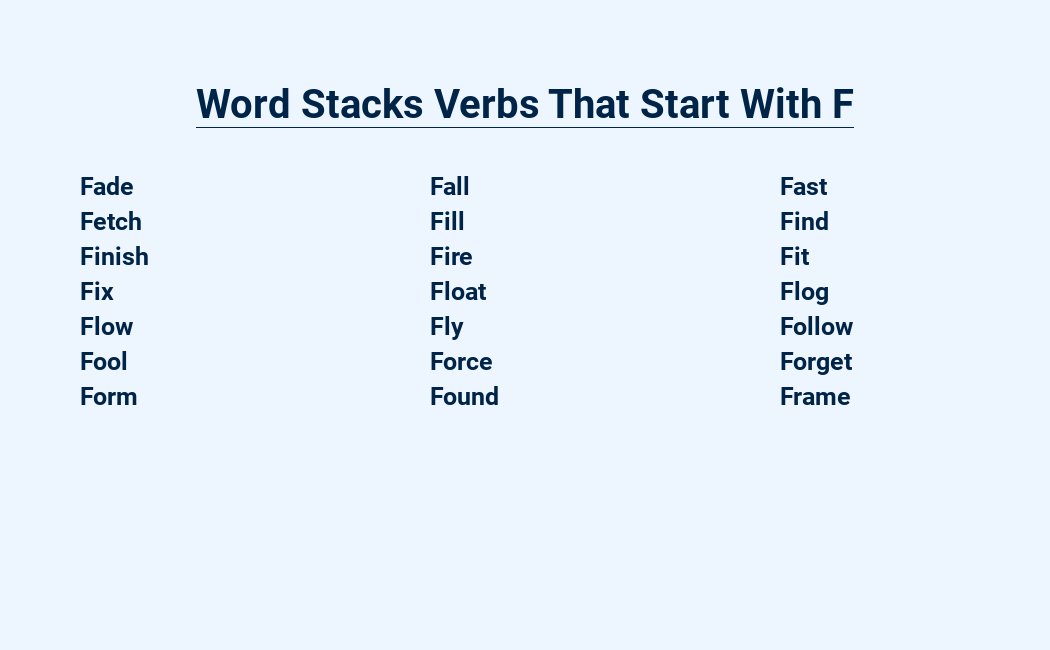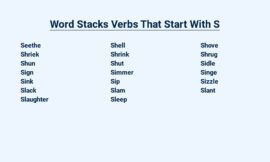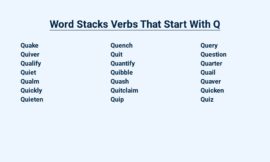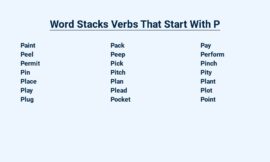Expand your vocabulary with my curated list of verbs starting with ‘F’! From folding clothes to foraging for food, forgetting appointments to forgiving mistakes, forming opinions to frying eggs, these versatile verbs will elevate your written and spoken communication.
| Verbs That Start with F | Description |
| Face | To front, squarely confront, encounter a challenge, meet head-on or deal with something difficult. |
| Fall | To drop or descend freely under the force of gravity. |
| Feed | To provide nourishment or sustenance to a person or animal. |
| Feel | To perceive something through touch, typically with the hand. |
| Fight | To engage in a physical contest with another person or group of people. |
| Fill | To make something complete or full. |
| Find | To locate or discover something that was lost or hidden. |
| Finish | To bring something to an end or a conclusion. |
| Fire | To cause a gun to shoot or a rocket to launch. |
| Fit | To be suitable or appropriate for a particular purpose. |
Fold
Fold (a piece of paper) in half or thirds
Folding paper in half or thirds is a common technique used in various crafts and activities.
This simple act of creasing the paper along a straight line allows for easy division or creation of symmetrical shapes.
Whether for making cards, envelopes, or origami, folding paper is a fundamental skill that adds versatility to paper-based projects.
Fold (a piece of clothing) neatly
Folding clothes neatly helps maintain their shape and quality.
To fold a piece of clothing neatly, lay it flat and smooth out any wrinkles.
Fold sleeves inward and align the edges.
Fold the garment in half lengthwise, then in half again.
Make final adjustments to ensure a compact and tidy fold.
Fold (one’s arms) across one’s chest
Fold (one’s arms) across one’s chest: A defensive or defiant gesture, often indicating displeasure, disinterest, or a closed-off attitude.
Fold (something) into a smaller size
Fold, a verb meaning to crease or bend something into a smaller size, often along a predetermined line or crease.
This action is commonly employed to make an item more compact, easier to store or transport, or to create a specific shape or design.
Fold (something) up for storage
Fold away your clothes, blankets, or other items for convenient storage.
Utilize this technique to keep your belongings organized and easily accessible when needed.
Forage
Forage for food or supplies
Scour the wilderness for sustenance and resources. Seek edible plants, fruits, and nuts.
Hunt for game.
Collect firewood and water. Craft tools and shelter from available materials.
Adapt and survive in the face of scarcity.
Forage through a pile of papers
Rummage through a heap of documents, searching for a specific piece of information or evidence.
Delve into a jumble of files, seeking the truth or a crucial detail.
Forage for information on the internet
Navigate the vast digital realm, seeking knowledge and insights hidden within the web’s intricate tapestry.
Unearth valuable data, explore hidden connections, and uncover the gems of information that await discovery.
Forget
Forget a name or a face
Forget a name or a face, a common lapse of memory, can be frustrating and embarrassing.
Whether due to stress, aging, or a medical condition, forgetting names and faces can be a nuisance or a sign of a more serious issue.
Forget to do something
Forget to do something implies a lapse in memory resulting in an undone task or obligation. It highlights the importance of remembering and fulfilling commitments, emphasizing the consequences of neglecting responsibilities.
Forget about a meeting or an appointment
Forget about a meeting or an appointment:
- Let down colleagues and clients.
- Cause inconvenience and disruption.
- Damage reputation and credibility.
- Miss out on important information and decisions.
- Create stress and anxiety.
Forgive
Forgive someone for a mistake
Forgive someone for a mistake: Overcome anger and resentment.
Release the negative emotions.
Let go of the past.
Move forward with a lighter heart.
Forgive oneself for a mistake
- Forgive yourself for errors in judgment.
- Learn from your mistakes and move on.
- Be kind to yourself and accept that everyone makes mistakes.
- Don’t dwell on the past, focus on the present and future.
Forgive and forget
In the realm of forgiveness, the act of forgetting may not always be feasible, but it is the choice to release resentment and bitterness that truly liberates the heart. Forgiveness allows us to move forward, free from the chains of the past.
Form
Form a committee or a group
Establish a committee or group to oversee, manage, or carry out a specific task or project.
Collectively contribute ideas, expertise, and resources to achieve a common goal.
Foster collaboration, communication, and decision-making among members.
Form an opinion or a belief
Forming an opinion or belief involves processing information, evaluating evidence, and reaching a conclusion. It requires critical thinking, open-mindedness, and a willingness to consider diverse perspectives.
Opinions and beliefs shape our understanding of the world and influence our actions and decisions.
Form a habit or a routine
- Establish a consistent time and place for your desired habit.
- Break your habit into smaller, more manageable steps.
- Find a cue or trigger to remind you to perform the habit.
- Reward yourself for completing the habit.
- Be patient and persistent, as habit formation takes time.
Form a queue or a line
Form a queue or a line to ensure orderly arrangement and efficient management of a group of people or items. This organized structure facilitates smooth flow, prevents chaos, and allows for fair and efficient processing or movement.
Fry
Fry an egg, bacon, or potatoes
Fry an egg until the white is set and the yolk is still runny, or until cooked to your liking. Fry bacon in a pan until crispy, or until cooked to your liking.
Fry potatoes in a pan with oil until golden brown and crispy.
Fry fish or chicken
Fry fish or chicken to achieve a crispy, golden-brown exterior and tender, succulent interior. Heat oil in a skillet or deep fryer, coat fish or chicken in seasoned flour or batter, and carefully submerge in the hot oil.
Fry until cooked through, ensuring a safe internal temperature.
Enjoy the crispy, flavorful delight!
Fry vegetables in oil or butter
Sautéed veggies, a colorful symphony of flavors, emerge from a sizzling pan, kissed by oil or butter’s golden embrace.
Fry something until it is crispy or golden brown
Fry something until it sizzles, crackles, and turns a beautiful golden brown. This technique, often used for foods like bacon, chicken, and potatoes, creates a crispy exterior and tender interior, adding an irresistible flavor and texture to your dish.
Fry something in a deep fryer
Immerse your culinary creations in a bubbling cauldron of hot oil, transforming them into golden-brown masterpieces.
The deep fryer’s sizzling embrace will bestow upon your food a crispy exterior and a tender, succulent interior, leaving you with a symphony of flavors that will tantalize your taste buds.
Final Verdict
The explored word stacks of verbs starting with “f” encompass a diverse range of actions, from the mundane to the profound. From the meticulous folding of items to the tireless foraging for resources, and the act of forgetting, forgiving, and forming connections, these verbs capture the essence of human experiences and interactions.
Whether it’s the sizzling of food in a pan or the formation of new ideas and relationships, the verbs beginning with “f” paint a vivid picture of the complexities and richness of life’s tapestry.




